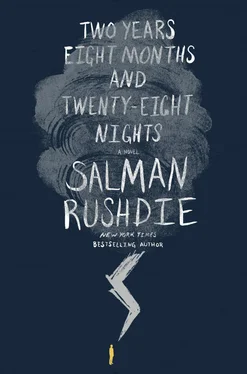And why did she care about mysterious Mr. Geronimo, Yasmeen asked her mirror at night, that silent old man who made no attempt to be cordial, was it because he was tall and handsome and stood up straight the way her father used to and was the age her father would have been if he had lived? Yes, probably, she conceded, her daddy issues were at work again, and maybe she would have been annoyed with herself for indulging in a form of transferred nostalgia if she had not been severely distracted at that moment by the appearance behind her, clearly reflected in her bedroom mirror, of a beautiful, skinny young-looking woman dressed all in black and seated cross-legged upon a flying carpet, which was hovering, like the gardener downstairs, approximately four inches above the floor.
Even though the normality of the city had been disrupted, most people hadn’t been able to get their heads around it, and were still dumbfounded by the irruption of the fantastic into the quotidian, even people like Blue Yasmeen, who had, after all, just encouraged Sister Allbee to be tolerant of the levitation going on month after month in the basement. Yasmeen unleashed an almost canine yelp and turned to face Dunia, who, it must be said, looked as startled as the orange-haired human female before her.
“In the first place,” Dunia said, tetchily, “you ought to be a person with whom I have important business, Mr. Raphael Manezes known as Geronimo, and you plainly are not. And in the second place, you have perfectly ordinary ears.”
Blue Yasmeen opened her mouth but was unable to produce a sound from it. “Geronimo Manezes?” the woman on the flying carpet repeated, still sounding irritable. It had been a long day. “Which is his apartment?” Yasmeen jabbed a finger at the floor. “One,” she managed to say. The woman on the flying carpet looked disgusted.
“This is why I prefer not to use carpets,” she said. “Their blasted positioning system is always going wrong.”
Ma, we have to move, we have to leave this house immediately, tonight if possible.
Why, my son, because a monster is in your bedroom? Normal, tell him to be normal.
What, even you are calling him Normal now?
Why not, Jinendra, this is America, everyone’s name gets shifted. You also are Jimmy now so get off your high horse.
Okay, never mind. Nirmal, tell Ma we have to leave here, it isn’t safe to stay.
Call me Normal. I’m serious.
Then I’ll call you Serious.
Jinendra, stop upsetting your cousin who gives you good job, good money. Why you don’t give him respect?
Ma. We have to get out of here before it’s too late.
And I should just leave my birds? What about the birds?
Forget the birds, Ma. He will return in full force and if we are here it will be a bad business.
I checked your bedroom. Your ma asked me to check so I checked. Nothing is out of ordinary. All is normal. No hole in the wall, no bhoot , everything A-1 tip-top.
Ma. Please.
My boy. Where to go? There is nowhere to go. Your mother is sick. Gallivanting god-knows-where is out of the question.
There’s Nirmal’s place.
What, you want to move in with me now? For how long? One night? Ten years? And what about this house?
This house is a danger zone.
Enough. Too much bakvaas . We will stay here only. Subject is closed.
And so on for many months, until he began to believe his mother was right, what he feared would never happen, the wormhole and Dunia and Natraj Hero had been hallucinations of the sort that, in ancient times, were caused by psychotropic wine, or mushrooms, or moldy bread, and he needed psychiatric help, maybe, medication, maybe, he was crazy. Until finally the night arrived, in the winter, in the snow, the deep unnatural snow, more snow than had fallen in living memory, the snow which people had started treating as a judgment or a curse, because lately everyone was treating all the weather that way, when it rained in California everyone started building arks, when an ice storm hit Georgia people abandoned their cars on the interstate and fled as if pursued by a gigantic ice-monster, and in Queens where people whose origins and dreams were all located in hot countries, people to whom snow still felt like a fantasy, no matter how many years they had lived here, no matter how often and how hard it fell, snow was surrealist, it was like black magic disguised as white, and so, yeah, on the night the black magic became real, the night when the monster actually showed up, it had snowed pretty hard, and that made it harder to run.
That was the night he had to run, he ran home from Normal’s office as fast — slipping, falling, rising again to run — as he could, with Normal puffing, wheezing, holding his ribs some distance behind, because of the fire, there it was, the fire instead of the house, the flames where the house used to be, the birds roasted or flown, and on a hard chair on the opposite sidewalk, with the feathers of her incinerated birds floating in the air above her head, facing the flames that were consuming her old life, the flames melting the snow so that her chair stood in a small pool of water, there was his mother, charred and soot-stained but alive, surrounded by a few of her possessions, a floor lamp standing by the chair, a peacock-feather fan, three framed photographs lapped by the melting slush, his mother immobile and wordless, red flames behind her, red flames that were somehow smokeless, why isn’t there any smoke, he asked himself, and as he raced up to her there were firemen saying, Poor lady, turn the chair around so she doesn’t have to watch, poor madam, she looks so cold, move her closer to the fire.
And no argument now about the cause, everybody saw the giant jinni who emerged from the fireball, born like all male jinn from smokeless fire, toothy, pockmarked, wearing his long flame-red battle shirt decorated with its ornate golden motifs, with his great black beard tied around his waist like a belt, his sword in its green and gold scabbard tucked into that hairy waistband on the left side, Zumurrud Shah no longer bothering to take the shape of Natraj Hero just to mess with little Jimmy’s head, but appearing in his full terrible glory: Zumurrud the Great, grandest of the Grand Ifrits astride his flying urn, whose explosion into the world, followed by three of his closest cohorts, signaled the end of the time of random strangenesses. This was the beginning of the so-called War.
Zumurrud the Great and His Three Companions


The Grand Ifrit Zumurrud Shah, on whose head was a golden crown taken from the head of a prince he had accidentally or not so accidentally decapitated once upon a time, had at a certain point in history become the philosopher Ghazali’s personal jinni: a terrifying entity whose name even Dunia the jinnia had been afraid to utter. Ghazali was not, however, the jinni’s master. The words master and servant are inappropriate when applied to the relationship between human beings and the jinn, for any service a jinni may perform for a human being is a boon rather than evidence of enslavement, an act of generosity, or, in the case of a jinni liberated from some sort of trap, a lamp, for example, a gesture of gratitude. The story goes that Ghazali had in fact freed Zumurrud Shah from just such a trap, a blue bottle in which a forgotten sorcerer had trapped him. Long, long ago, wandering in the streets of his native Tus, Ghazali had spotted the opaque bottle lying abandoned in the heaps of trash which unfortunately disfigured that old town of salmon minarets and enigmatic walls, and had intuited at once, as philosophers with the proper training are able to intuit, the presence of a captive spirit therein. He scooped up the bottle casually, but with the guilty expression of a novice burglar, and pressing his lips against the royal blue glass whispered a little too loudly the occult incantation that is the required opening for all dialogues with captured jinn:
Читать дальше














